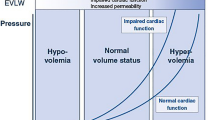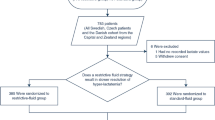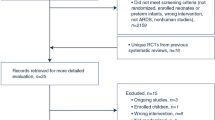Abstract
Since the publication of the Surviving Sepsis Campaign guidelines, a number of additional and highly relevant studies have been published addressing the issue of vasopressor use during septic shock. While these new results are provocative, none of the studies are definitive. In sum, they suggest that maybe we should not be thinking of one vasopressor versus another in a winner-takes-all sense. Rather, we should be looking for the best balance of vasopressor agents and, further, the choice likely depends on clinical context. Clinical context may drive the choice of adrenergic agonist; for example, norepinephrine may be superior to dopamine when the potential for arrhythmias is of concern. Norepinephrine may be superior to epinephrine if elevated lactate associated with epinephrine use confounds the clinical picture. The Vasopressin and Septic Shock Trial (VASST) identified an effective dose of arginine vasopressin (AVP) when adrenergic agonist doses are low, but higher doses of AVP may be appropriate in the context of very high adrenergic agonist doses. The effect may be a direct beneficial AVP effect or indirect sparing of adrenergic agonist use. The choice to add AVP may also be influenced by the clinical context, including renal function or the concomitant use of corticosteroids. These interim conclusions, in truth, are hypotheses warranting randomized controlled trials adequately powered to test for survival differences in these severely ill patients.
Similar content being viewed by others
References
Varpula M, Tallgren M, Saukkonen K, Voipio-Pulkki LM, Pettila V (2005) Hemodynamic variables related to outcome in septic shock. Intensive Care Med 31:1066–1071
Rivers E, Nguyen B, Havstad S, Ressler J, Muzzin A, Knoblich B, Peterson E, Tomlanovich M (2001) Early goal-directed therapy in the treatment of severe sepsis and septic shock. N Engl J Med 345:1368–1377
Dellinger RP, Levy MM, Carlet JM, Bion J, Parker MM, Jaeschke R, Reinhart K, Angus DC, Brun-Buisson C, Beale R, Calandra T, Dhainaut JF, Gerlach H, Harvey M, Marini JJ, Marshall J, Ranieri M, Ramsay G, Sevransky J, Thompson BT, Townsend S, Vender JS, Zimmerman JL, Vincent JL (2008) Surviving sepsis campaign: international guidelines for management of severe sepsis and septic shock: 2008. Crit Care Med 36:296–327
Annane D, Vignon P, Renault A, Bollaert PE, Charpentier C, Martin C, Troche G, Ricard JD, Nitenberg G, Papazian L, Azoulay E, Bellissant E (2007) Norepinephrine plus dobutamine versus epinephrine alone for management of septic shock: a randomised trial. Lancet 370:676–684
Myburgh JA, Higgins A, Jovanovska A, Lipman J, Ramakrishnan N, Santamaria J (2008) A comparison of epinephrine and norepinephrine in critically ill patients. Intensive Care Med 34:2226–2234
De Backer D, Biston P, Devriendt J, Madl C, Chochrad D, Aldecoa C, Brasseur A, Defrance P, Gottignies P, Vincent JL (2010) Comparison of dopamine and norepinephrine in the treatment of shock. N Engl J Med 362:779–789
Landry DW, Levin HR, Gallant EM, Ashton RC Jr, Seo S, D’Alessandro D, Oz MC, Oliver JA (1997) Vasopressin deficiency contributes to the vasodilation of septic shock. Circulation 95:1122–1125
Maybauer MO, Maybauer DM, Enkhbaatar P, Traber DL (2008) Physiology of the vasopressin receptors. Best Pract Res Clin Anaesthesiol 22:253–263
Russell JA, Walley KR, Singer J, Gordon AC, Hebert PC, Cooper DJ, Holmes CL, Mehta S, Granton JT, Storms MM, Cook DJ, Presneill JJ, Ayers D (2008) Vasopressin versus norepinephrine infusion in patients with septic shock. N Engl J Med 358:877–887
Torgersen C, Dunser MW, Wenzel V, Jochberger S, Mayr V, Schmittinger CA, Lorenz I, Schmid S, Westphal M, Grander W, Luckner G (2010) Comparing two different arginine vasopressin doses in advanced vasodilatory shock: a randomized, controlled, open-label trial. Intensive Care Med 36:57–65
Bauer SR, Lam SW, Cha SS, Oyen LJ (2008) Effect of corticosteroids on arginine vasopressin-containing vasopressor therapy for septic shock: a case control study. J Crit Care 23:500–506
Russell JA, Walley KR, Gordon AC, Cooper DJ, Hebert PC, Singer J, Holmes CL, Mehta S, Granton JT, Storms MM, Cook DJ, Presneill JJ (2009) Interaction of vasopressin infusion, corticosteroid treatment, and mortality of septic shock. Crit Care Med 37:811–818
Patel BM, Chittock DR, Russell JA, Walley KR (2002) Beneficial effects of short-term vasopressin infusion during severe septic shock. Anesthesiology 96:576–582
Gordon AC, Russell JA, Walley KR, Singer J, Ayers D, Storms MM, Holmes CL, Hebert PC, Cooper DJ, Mehta S, Granton JT, Cook DJ, Presneill JJ (2010) The effects of vasopressin on acute kidney injury in septic shock. Intensive Care Med 36:83–91
Acknowledgments
This study was supported by Heart and Stroke Foundation of B.C. and Yukon.
Author information
Authors and Affiliations
Corresponding author
Rights and permissions
About this article
Cite this article
Maybauer, M.O., Walley, K.R. Best vasopressor for advanced vasodilatory shock: should vasopressin be part of the mix?. Intensive Care Med 36, 1484–1487 (2010). https://doi.org/10.1007/s00134-010-1942-1
Received:
Accepted:
Published:
Issue Date:
DOI: https://doi.org/10.1007/s00134-010-1942-1




